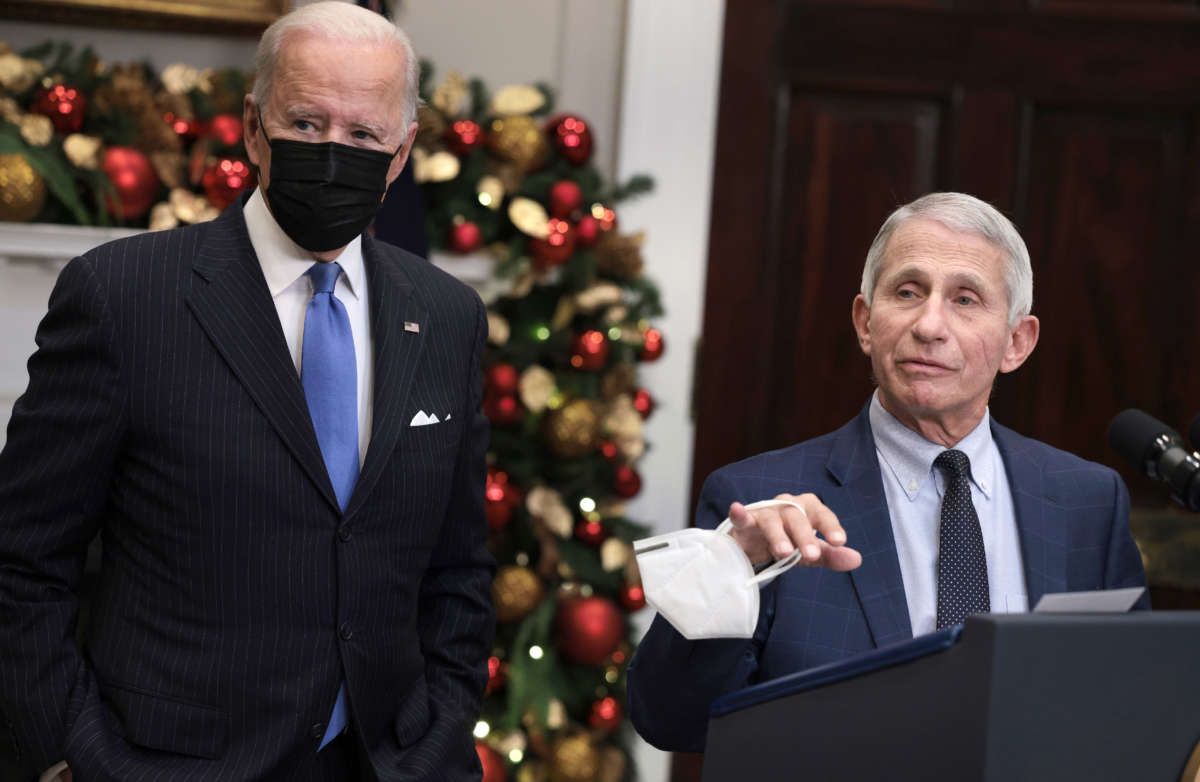On Thursday, the Biden administration will unveil a list of measures to renew the fight against COVID-19 as the U.S. heads into its second winter of the pandemic.
The announcement, which will be made by President Joe Biden at the National Institutes of Health at noon, was preceded by a media call on Wednesday night with administration officials, who detailed the measures that will be taken in the coming weeks and months.
The renewed measures also come as Omicron, a new variant of coronavirus first identified by epidemiologists in southern Africa last month, was detected in a California patient on Wednesday.
During the press call, the White House told reporters that the measures will help combat the spread of COVID-19 while still allowing schools and businesses to remain open. “We are pulling out all the stops to get people the maximum amount of protection as we head into winter months,” a senior White House official said.
Some of the upcoming measures will be completely new, while others build upon pandemic plans the administration already has in place. The president will announce a plan, for example, to ensure private health insurers reimburse at-home COVID-19 tests, a move that could allow more than 150 million Americans to test themselves at their own convenience.
That plan won’t be implemented until mid-January at the earliest, and doesn’t specify how often Americans with private health plans can expect to be reimbursed.
Allowing individuals to administer their own at-home tests is beneficial because it will allow them to test at the onset of symptoms, so that they can take adequate quarantine measures and receive antiviral medications right away.
In order to make testing more accessible to those without private health insurance, the administration said it was planning to distribute 25 million at-home tests to community health centers and rural clinics.
Increased testing is viewed as necessary for the upcoming phase of the pandemic, as vaccination rates have stalled in recent weeks. From the start of November to the start of December, the rate of Americans who are fully vaccinated for protection against coronavirus increased by less than 2 percent, The Washington Post reported.
“So much of the next phase of covid depends on easy, rapid access to testing,” to ensure those who are infected get early treatment, said Nirav D. Shah, president of the Association of State and Territorial Health Officials, to The Post.
The White House also plans to introduce stricter travel standards, including requiring travelers to test negative for COVID-19 on the day they board a plane for the U.S. This comes after an announcement from the Biden adminstration last week that, in light of the discovery of the Omicron variant, the U.S. would bar travelers from several south African nations, a move that many health experts and world leaders have blasted as being prejudiced and counterintuitive to a strategy of “global solidarity” in tackling the pandemic.
The new measures also include a plan to launch hundreds of new vaccination clinics, including “family vaccination clinics,” billed as “one-stop shop sites [that] will offer vaccinations for the whole family.” Some of those clinics will be mobile, administration officials said, making it easier for “hard-to-reach communities” to gain access to clinics.
Biden is planning to announce a “nationwide campaign to get people their booster shots,” as 100 million Americans who are eligible haven’t yet done so. Around 63 million Medicare recipients should expect a notice soon encouraging boosters. The administration plans to collaborate with AARP to get seniors boosted, too.
The new moves by the Biden administration may be as political as they are practical. While Biden received positive marks in the early months of his tenure for his response to the crisis, approval numbers on his handling of COVID-19 have dropped in recent months.
In July, 55 percent of Americans approved of how Biden was handling the crisis, with less than a third of voters (32 percent) disapproving, according to an Economist/YouGov poll. As of late November, however, Americans are evenly split, with 44 percent saying they approve of Biden’s approach to the crisis, versus 44 percent who say they disapprove.
Since the start of the pandemic, there have been 782,826 deaths in the U.S. related to coronavirus. Biden’s drop in approval ratings relating to his COVID response may be due, in part, to the fact that there have been more coronavirus deaths in 2021 than there were in 2020.
However, Biden has served for a slightly longer period of time during the crisis than Trump did. He has also had to deal with the Delta variant of the virus, which spreads faster and more easily than the original version of COVID-19 did.
Under former President Donald Trump, who Biden repeatedly criticized for a lackluster response to the crisis, there were around 412,900 COVID deaths, while under Biden, there were around 369,200 deaths from the virus.
Join us in defending the truth before it’s too late
The future of independent journalism is uncertain, and the consequences of losing it are too grave to ignore. To ensure Truthout remains safe, strong, and free, we need to raise $43,000 in the next 6 days. Every dollar raised goes directly toward the costs of producing news you can trust.
Please give what you can — because by supporting us with a tax-deductible donation, you’re not just preserving a source of news, you’re helping to safeguard what’s left of our democracy.
